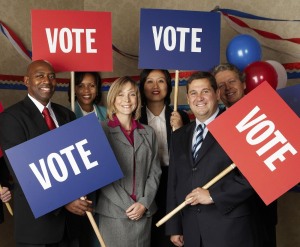The following was written by Vishali Gandhi, LWVNJ summer intern.
On June 12th, the League of Women Voters of New Jersey, in conjunction with several other groups, participated in a lobbying effort to promote the passage of Assembly bill 2108. A2108 would ban the treatment, disposal, processing, or discharge of fracking waste in our state (read the full text of the bill here). This effort involved directly lobbying specific members of the New Jersey Assembly to post the bill so that it could move from the committee to the floor of the legislature to be voted on. It also included a rally to raise awareness and show support for the speedy passage of the bill. This truly was the perfect opportunity as an intern and, more importantly, as an activist, because I was able to experience the democratic process first-hand, both inside and out.
The day began as I met with a number of supporters gathered outside the doors of a committee hearing in the statehouse. We were waiting for members of the Assembly to exit so that we could talk to them about A2108 and urge them to move the bill out of committee. As the hearing drew to a close, we began to speak with the members of the Assembly as they exited and I listened in as each person explained why the passage of this bill was important to them.
Despite having very busy schedules, they stayed and listened to what everyone had to say. Meeting with legislators face-to-face is a great way to get your voice heard. Elected representatives are more than happy to listen to concerns from constituents, and it is a very effective way to directly contact representatives.
After the committee hearing, we moved outside to the front of the State House where a sizable group was forming, all in favor of the swift passage of A2108. What I found really amazing as I looked at the crowd was its heterogeneity. There were a number of organizations present, all with different reasons for supporting the bill’s passage. There were mothers who were worried about the safety and health of their children, as well as student-powered environmental groups who believed strongly in the cause. Though the group itself was incredibly diverse, there was a singular passion that was common among everyone there. I was inspired to see that everyone had a shared goal of passing the bill and preventing disastrous ecological damage from taking place within New Jersey’s borders (read more about hydrofracking waste here).
As I listened to calls-to-action from representatives of each of the groups, as well as members of the Assembly who were in support of the bill’s passage, I thought about the importance of political participation. A2108 has been introduced and passed through both houses of the NJ legislature for several years now, but every year, the bill is vetoed by Governor Chris Christie. Members of the legislature who support the bill then attempt to override the veto, but they have not been able to do so yet.
So the question then is: what effect does lobbying actually have? Why engage in these attempts to pass a bill that may just fail? The reason for engaging in political advocacy is raising awareness and making change. The efforts of all of the people who rallied to show support for the bill may not directly result in the passage of the bill, but by making people more aware of the issue, there is more pressure on legislators to post and pass the bill. In fact, a few weeks after the lobbying effort, and after a lot of pressure from activists across the state, Assembly bill 2108 was posted and passed both houses of the NJ legislature and is now awaiting the governor’s signature. This truly was a victory for the League and all of the activists who showed support and it is a testament to the positive effects of engagement.
When people think of civic engagement, often the first thing that comes to mind is voting. While voting is undeniably an important part of civic engagement, struggle to create change and make progress; holding those representatives accountable for their actions and mistakes is the other part.
Getting involved in the political process does not necessarily mean attending every committee hearing and participating in every rally, but instead being aware of the issues and being a part of the process in whatever way you can. A good first step is to join the League of Women Voters so that you can stay up-to-date with issues affecting New Jersey citizens. The League organizes many events during the year that can help you get involved and learn more about issues that are important to you. The League’s website also has a wealth of information on different issues and events.
The New Jersey legislature’s website is another helpful resource. On it, you can find all of the bills that are being considered by the legislature, as well as previous bills. You can also find your representatives and see how they have voted on different bills. If there is an issue or a specific bill that is important to you, a great way to get your voice heard is to contact your local representative’s office by phone, email, or by mail. You can also go and sit in on a committee hearing to find out more about a bill. Schedules for committee hearings, which are open to the public, can be found here.




